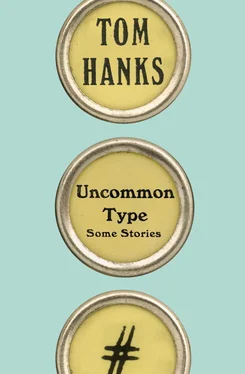He took the lift up to the ninth floor, hearing a feminine voice announce “Chronometric Adventures” just before the door opened. The company’s motto— The Past Is Important to Us —was inscribed on the wall, and, under it, Howard Frye was waiting.
“Mr. Allenberry. Good to see you again.” Howard had been the facilitator of every one of Bert’s adventures. “I trust you are well?”
“Dandy. You?”
“Just over a cold. My son brought it home from school.”
“One advantage of not having kids,” Bert said. Cindee had not once said anything about wanting a child, L’Audrey before her would have made as horrible a mother as she did a mate, Mary-Lynn very much wanted to conceive but when a doctor told her that Bert’s low sperm count made the biology highly unlikely, she looked to other men for satisfaction. She had remarried and quickly popped out two girls and a boy. His first marriage, to Barb, produced a baby girl. But the divorce was so filled with rancor and enmity that the only contacts Bert had with his daughter—once she turned eighteen—were occasional dinners in London, where she lived far too comfortably thanks to his support checks.
“Shall we get you to Pre-Ad?” Howard asked.
“Time’s a-wasting.”
“Funny, but time is actually a-plenty.” Howard chuckled.
In the Pre-Adventure room, Bert was rechecked by the Medical Team. His fluids were sampled and scanned, his heart registered, and the twelve other physical properties that are affected by Progression/Reprogression were tested. He was given the five injections that would bolster his body on the molecular level and the antinausea meds to ease those initial moments of 1939. He removed his clothes as well as his rings, watch, and the thin gold chain he wore around his neck. No items from today could survive the trip to yesterday, as their molecules could irreconcilably screw up the process. Once naked, he put on a robe with the Chronometric Adventures logo and sat through the pro-forma legal warnings.
First there was the video—slick and snappy—warning of dangers and explaining the protocols. Then came the reading material, which repeated—word for word—what had just been said. Bert already knew a person could die during Reprogression, though no one ever had; an adventurer had options for experiences—one could spend the day doing anything he or she wished—but none when it came to certain key procedures. With his thumbprint, Bert acknowledged—once again—that he understood and agreed to it all. Then Howard came into the Pre-Ad room with the large shake-like drink that would protect his digestive tract from pesky germs, circa 1939.
“Bring on the shoe leather, Howard,” Bert said, toasting his glass at him.
“By now you should be able to recite this to me,” said Howard, clearing his throat. As Bert sipped the blueberry-flavored liquid, Howard put into simple terms the conditions Bert had already agreed to. “You have voluntarily chosen to have Chronometric Adventures provide physical time Reprogression to this very location on June 8, 1939, for a period of no more and no less than twenty-two hours as measured by standard recognized time. From the same Volume, at 7:00 p.m. of June 8, 1939, you progress back to this place on this very day. You understand that, don’t you?”
Bert nodded. “Yep.”
“Chronometric Adventures in no way claims your holiday in the past is free of risk. Your adventure is governed by the same laws of physics, rules, and behavior as we know to be common.”
“I fall down, I break a leg. I get punched in the nose, it’s broken.”
“Indeed. You will be unsupervised during those twenty-two hours. We suggest you adhere to the Agenda we have prepared with you. Another day at the World’s Fair, yes?”
“You should go yourself, Howard.”
Howard laughed. “Being African American, 1939 New York doesn’t hold the same wonder for me.”
“I get that,” Bert said. On his trips back in time almost every black face he saw belonged to a porter or a janitor. Though there were black families at the Fair, taking in the same exhibits, dressed for the occasion, they were looking for promises of a future different from his.
“Should you change plans—like seeing a show or loafing in the park—there is no risk as long as you adhere to the protocols for Progression.”
“I’m going back to Flushing Meadows. Maybe next time I’ll loaf in the park.” Bert thought of spending a day with Carmen in Central Park and wondered how he could pull that off. Virginia could ride the carousel! They could take in the zoo as it originally looked!
“Ah, yes. Next time .” Howard called up Bert’s file on his pad. “Mr. Allenberry, I’m afraid you have reached your limit for Reprogression at this C.A. franchise.”
“What?” Bert still had a third of his shake to finish.
“Your numbers from the Pre-Ad exam were a bit off from your last trip with us,” Howard said. “You are showing elevated levels of Trillium in your blood and lowered measurements of cellular fluidity.”
Bert didn’t like the sound of that.
“Everyone’s constitution is different, Mr. Allenberry. In fact, some of our clients have been allowed only two or three of our packages. Six is going to max you out.”
“Why?”
“Molecular dynamics, Mr. Allenberry. The round trip to 1939 is a very long haul for your tissues, your body proteins, your marrow density, and your nerve endings. We can’t run the risk of wearing you out. It’s hypothetically possible a seventh, or even an eighth adventure to the World’s Fair would be safe for you, but our insurance model disallows that. That’s the bad news.”
Bert was thinking of Carmen, of Virginia, of the three of them eating pie and visiting Elsie the Cow. He would do those things with them just one more time. Bad news, indeed.
“The good news,” Howard chirped, “is that your Chronometric Adventures don’t have to end in 1939 New York. There’s Nashville in 1961. You could go to the Grand Ole Opry. We have a franchise opening in Gunnison, Colorado—a beautiful cabin in 1979. Not much goes on there, but the views are terrific.”
Bert had stopped drinking. He was thinking of Carmen, of her vanilla-lilac scent and her hazel eyes.
“I am sorry, Mr. Allenberry, that’s the way it is. The past is important to us, but your long life is more so.”
“In that case, I’m going to need something else to take back with me,” Bert said.
—
Bert felt the compression suit tighten as all the atoms of room 1114, including his, were jigged up by the mechanics of Chronometric Adventures. He had learned not to panic during Reprogression but still was not used to how cold it got, so cold that he lost all focus, all equilibrium. He knew he was lying on what would become a bed in 1939, but everything was tumbling. He fought to stay awake, alert, to see the actual process of the room reverting in time, but, as before, he passed right out.
When he felt a pounding headache, he knew he was in 1939 once again. The headaches were brutal but mercifully brief. Bert fought his way out of his compression suit—like a scuba diver’s, one size too small—and sat naked on the edge of the bed, biding his time until his cranium no longer felt the crash of ball-peen hammers.
As before, the double-breasted suit was hanging in the open closet with shoes and socks on the floor. On a thin wire hanger was a button shirt and tie. Undergarments were in a basket on a chair. On the nightstand were the watch, a wedding band, a signet ring, and the wallet that contained his ID and other items that were accurate for the period and made out of pre–World War II materials. There was cash, a total of fifty dollars in the funny-looking paper currency that was once legal tender. There were heavy coins as well—a half dollar imprinted with a lady holding wheat looking toward the setting sun and ten-cent pieces, called dimes, with the head of the god Mercury. Nickels were worth five cents, and single pennies had real value in 1939.
Читать дальше











